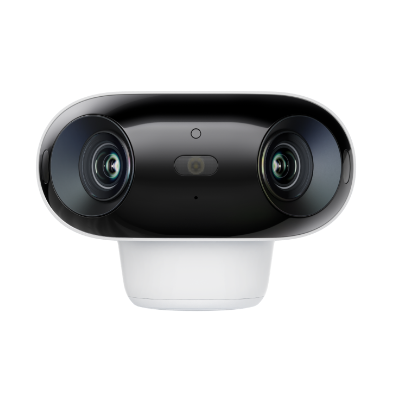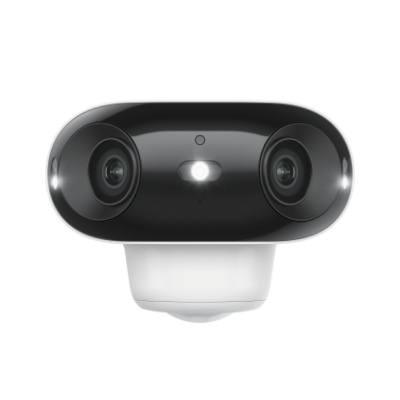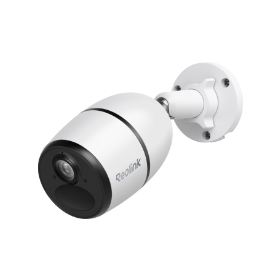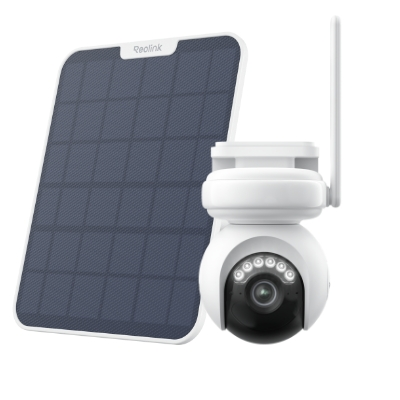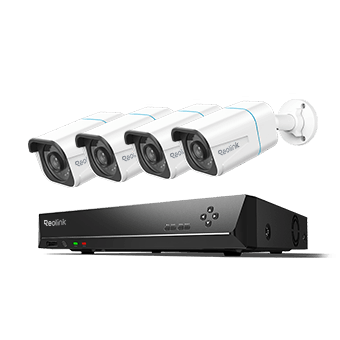What Causes Video Loss in Security Cameras? Reasons and Quick Fixes

If the surveillance cameras, some or all of them, suddenly stop working, showing video loss or signal loss on the monitor or screen intermittently, then you might find this article rather helpful. We look into common reasons for video loss problem on security cameras and systems, DVRs camera systems, and provide tips to fix CCTV video loss problems.
What’s Video Loss on Security Cameras?
CCTV video loss occurs in various circumstances and forms such as video loss on all cameras, video loss on one CCTV camera, camera video going black at night, CCTV no video signal, camera with black screen, cameras stopping recording, cameras going on and off, camera not working or cameras showing vertical or horizontal lines.
For instance, a CCTV surveillance system loses video feeds on one or all cameras, displaying video loss at the same time.
CCTV camera gets a loose connection, goes black at night, or gets no video with a surveillance camera showing a black screen. Sometimes it also shows CCTV camera no video signal.
Sometimes, the camera video flickers on and off, showing lines on the screen and monitor. Or the H.264 DVR gets no picture, camera not working and etc.
Reolink Security Camera Sale - Secure Your Home with Huge Savings!
Save big with Reolink! Special deals on security cameras, doorbells, and systems.
What Causes Video Loss in Security Cameras?
Many users tried and used different ways to solve the video loss but in no luck. Today we share some of the best practices to deal with video loss in CCTV.
Video Loss Reason 1: Insufficient Power Supply
The insufficient power supply is, very often, the culprit of the video loss on one or all security cameras, CCTV video loss at night, video signal loss on screen, camera going black at night, or camera video flickering on and off.
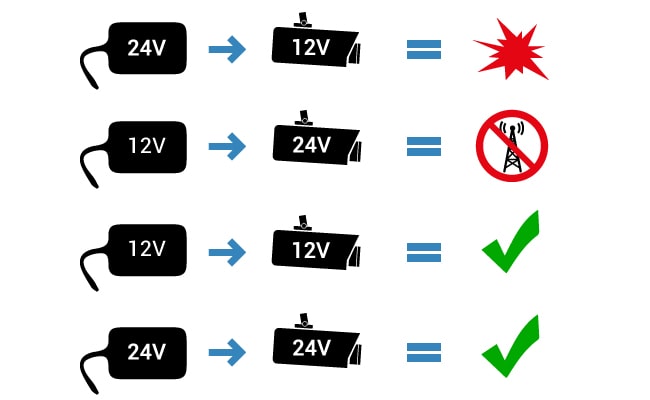
Here are some common reasons for insufficient power supply to CCTV cameras:
- Loose cable connection
- PoE switch or PoE injector
- Cable is too long, or one cable is supplying too many cameras at once
- Faulty power cables (old, damaged, degraded or cut)
Loose cable connection, for example, between DVR/NVR with cameras, between CCTV cameras and monitor or screen, power adapter, or any possible loose connection in camera power supply could cause video loss.
Video Loss Reason 2: Power Spike & Interference
Another horrendous hazard for video loss in CCTV is power spike.
It is likely to cause sudden video loss on security cameras, all CCTV cameras black screen, a camera with the electrified surface, the camera with a vertical/horizontal line, or serious damage to the camera circuit board or other components.
Here are some common reasons for power spike & interference:
- Mounting security camera to a metal/conductive surface
- Lightning strikes
- Strong electrical currents interference from nearby electrical equipment
Video Loss Reason 3: Weak WiFi Connection or Low Bandwidth
Video loss or weak video signal among WiFi security cameras and systems could be caused by unstable network connections, weak WiFi connection or low internet bandwidth.
Here are common reasons for network-induced CCTV camera video loss:
- Long distances between wireless security cameras and home routers
- Too many barriers between your camera & WiFi router
- WiFi signal interruption & interference
- Insufficient bandwidth via PoE switch or NVR
- The loose connection between BNC connector and security cameras or H.264 DVR
BNC connector, which is commonly used on thin Ethernet network cables and network cards to transmit signals, however, unexpectedly and frequently, explains the constant signal loss and video loss on PoE home surveillance cameras or H.264 DVR.
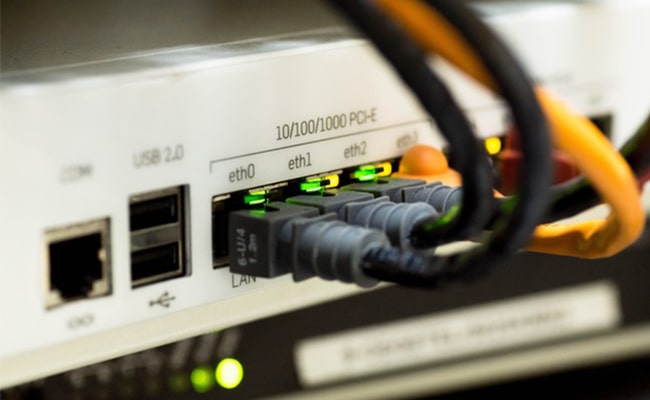
Some users set up their home surveillance system by connecting the cameras to multiple PoE switches before connecting it to the NVR or other network storage like NAS.
In such cases, video loss or camera not recording is likely to occur due to the bandwidth and network traffic.
In addition, a PoE switch or injector, if being loose or cut, also results in signal transmission disruption and video loss in the process.
If you happen to have wireless security cameras installed, camera video loss displaying during live view could be the result of WiFi signal interruption, be it as a signal drop or signal loss.
Once the wireless cameras’ connection with video recorders was severed, it’s impossible to upload or stream video feed on any devices.
Video Loss Reason 4: IR Cut Filter & Faulty IR Night Vision
Some users experience CCTV camera black screen or video going black at night, it’s likely that the camera lacks infrared night vision, or the IR night vision camera doesn’t have an IR cut filter or a faulty IR sensor, or you simply forget to turn the IR on.
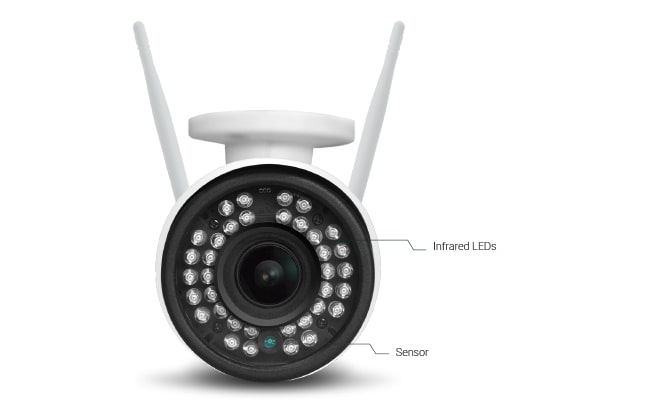
Video Loss Reason 5: Signal Type & Compatibility
Sometimes, your DVR or NVR shows video loss or no video, it’s possible that your NVR/DVR is not capable of decoding the video stream, especially when you apply security cameras from different brands.
Or cameras with a higher resolution like 5MP or 4MP can’t be decoded or compatible with NVRs/DVRs that are designed to decode 1080p camera.
In some rare cases, the DVR is not able to understand a signal type that the CCTV camera is using, especially among some old CCTV cameras.
Video Loss Reason 6: Problems in Cables or Wires
BNC Cables or Ethernet network cables, to some extent, could have an impact on the functionality of surveillance cameras, especially analog CCTV cameras which could suffer a greater risk of video loss or signal loss than PoE cameras.
In such a context, hardwired surveillance cameras will be more likely to encounter with wiring-related glitches, such as video loss on analog CCTV cameras and PoE security cameras.
Twisted or bent cables particularly link to signal loss or weak signal passing through to the hub. In some common cases, video feed loss or failures in video streaming will occur.
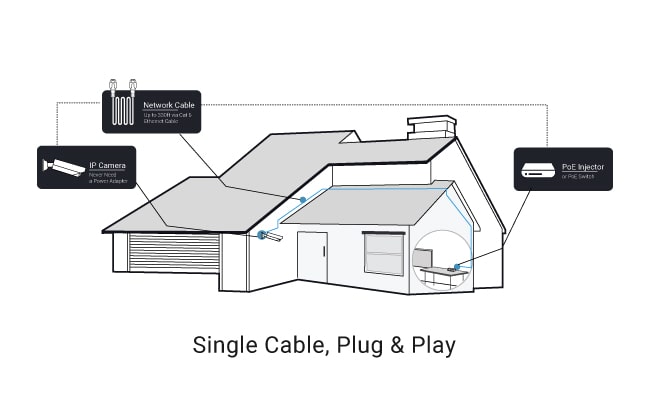
Video Loss Reason 7: Hardware & Firmware Problem
If you rule out power disruption, connection problems, BNC connector, or cable issue, but still fail to get the bottom of video loss in CCTV, it may be, just maybe comes down to the very fact that your NVR/DVR or surveillance cameras are in a shabby state.
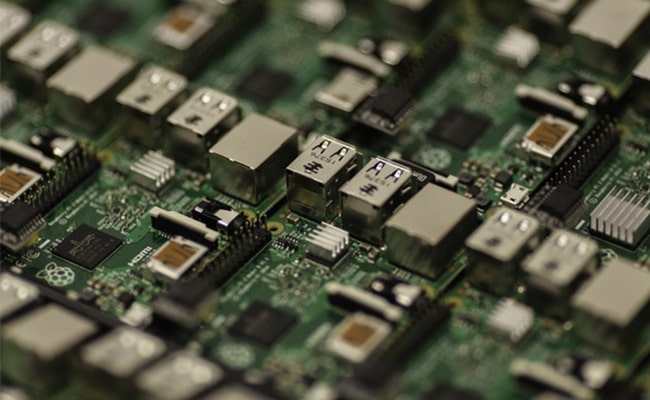
Sometimes, video loss problem could also happen because of the old or bug-ridden firmware that has been upsetting your nerves all along.
The possible solution would be to have a quick check on the update info and consider a firmware update to get better performance but not with certainty.
Video Loss Reason 8: IP Address Conflicts
If you can’t solve video loss on security cameras even after checking the power supply and network connection, it is possible that there are IP address conflicts that stop you from viewing the security cameras.
How to Fix Video Loss in Security Cameras?
If you’ve identified the causes of video loss on your CCTV camera, try the following quick fixes to troubleshoot the issue.
Fix 1. Check all power connections
If you've identified that an insufficient power supply has caused your CCTV camera to lose video, double-check all power connections, power splitters, cable connectors, and etc. to exclude connection issues. Switch ports to make sure the DVR/NVR port is providing power to the cameras. If you use PoE cameras, connect it directly to the NVR (if there is any) instead of via a PoE switch because the PoE switch could potentially not supply insufficient power.
Besides, try using shorter BNC or Ethernet cables to power surveillance cameras system and avoid using low-quality extension cables or extension cords. If you are using battery-powered security cameras, for instance, Reolink Argus 3 Pro, make sure the battery is not dead or charged either via power adapter or solar panel.
Fix 2. Use power surge protector
If you find that a power spike caused this problem, try using power surge protectors or lightning surge protectors to protect your CCTV cameras from a lightning strike. UPS (Uninterruptible Power Supplies) units will ensure power supply for all camera when there is a power outage, mitigating concerns for camera power-off. Besides, if it’s hard not to mount your camera to anything other than a metal/conductive surface, add a block of wood in between.
Fix 3. Get the camera closer to router
Check home routers and PoE switches and get your security cameras closer to your home router. Reconnect BNC connector and unplug PoE switch or injector to troubleshoot the video loss on analog and IP PoE security cameras.
For wireless security cameras, it’s advised to examine network and possible network interruption by checking router and channels.
If you are using cellular security cameras like Reolink Go Plus, make sure the SIM card is properly inserted, not loose, or the data is not maxed out.
Fix 4. Ensure proper night vision settings
Check camera settings to make sure the IR is on. To see if the IR LEDs are working, bring in the camera and put them in a low-light environment to see if the IR LEDs is on.
If your outdoor security cameras don’t come with IR night vision or defective IR LEDs, use external IR illuminators or floodlight when necessary.
Fix 5. Consult brand support
Consult the support team of security camera brands on the technical details.
Make sure to eliminate all possible hiccups before returning them for good since many problems will resolve itself if giving them time, and give yourself some time as well before throwing them away.
Remember to use the same brand of NVR/DVR and cameras and make sure the DVR/NVR is able to decode the video stream.
Fix 5. Inspect all the wires
Check the wiring around your house and every inch of them until you are 100% sure about all wires are firmly connected and fine without any degradation or impairment.
Examine all cables, especially cables through crawl space or attic, to see if the cable is chewed, bent, cut or damaged. Try powering the CCTV cameras or IP cameras with new cables if necessary.
Fix 6. Update camera firmware regularly
Some users suggest updating firmware does help resolve this problem. Caution is warranted before updating and thorough understanding of the update is needed.
When the CCTV cameras, NVRs, or H.264 DVRs go wrong and constantly suffer from video loss, black screen, or no video, it's time to buy new and quality security cameras and systems.
Fix 7. Inspect all the wires
Check the wiring around your house and every inch of them until you are 100% sure about all wires are firmly connected and fine without any degradation or impairment.
Examine all cables, especially cables through crawl space or attic, to see if the cable is chewed, bent, cut or damaged. Try powering the CCTV cameras or IP cameras with new cables if necessary.
How to Fix Video Loss in Reolink Cameras?
To avoid Reolink video loss, it’s always advised to regularly check your security camera system and take some necessary precautions to stomp out video loss in CCTV cameras and NVRs.
Video loss on Reolink NVR
If you find Reolink camera video loss on the NVR, try the following steps:
- Make sure that the network cable meets specification requirements.
- Make sure that the number of connected cameras does not exceed the NVR limit number.
- Use the original power adapter for the NVR.
- Replace the short network cable, and network port between the NVR and cameras.
- Update to the latest firmware.
Video loss on Reolink PoE cameras
- Make sure the NVR hardware supports/is compatible with this IPC.
- pdate the cameras and NVR to the latest firmware.
- Swap the working ports and cables to make sure that the Ethernet cable and port are working for both the NVR and cameras.
- Use the original power adapter for the NVR.
- Unplug all cameras and only connect the specific camera.
- Plug the problematic camera into the router (work alone without connecting to the NVR) with a power adapter or PoE switch. Check if the camera can work normally as a stand-alone camera on the App/Client.
Note: If the steps mentioned above didn't solve your problem, reach out to our support team for help.
Quality & Reliable Security Cameras & Systems Recommendation
Reliable camera system goes a long way to giving you real peace of mind.
Low-quality products will constantly experience problems in image, videos, NVR and tons of other problems, while high-quality and trusted video surveillance cameras system not only provide you with reliable products but also long-term stability and reassurance.
Battery-powered 4K Color Night Vision Camera - Reolink Argus 4 Pro
The Argus 4 Pro is a dual-lens 4K color night vision security camera. With a genuine 4K resolution and an impressive 180° field of view, it captures detailed images across a wide area. Thanks to the latest ColorX Technology, it provides full-color night vision even in low-light conditions, eliminating the need for spotlights.
Additionally, it offers flexible local storage options, including microSD (up to 128GB), and integrates seamlessly with Home Hub for managing multiple cameras and cross-camera tracking. It is easy to prevent video loss.
4k 180° Wire-free Color Night Vision Camera
4K UHD 180° Blindspot-free View; Color Vision Day and Night; 30% More Battery Life; Dual-band Wi-Fi 6; Smart detection.
For consumers that require full-color night vision without apparent spotlights, the Reolink Argus 4 Pro is an excellent choice. Alternatively, if you want an inexpensive solution that still performs well, the Argus 4 standard version is worth considering.
4k 180° Blindspot-free Wi-Fi 6 Camera
4K UHD 180° Blindspot-free View; Dual-band Wi-Fi 6; Smart detection; Easy Installation Anywhere
Wire-Free Solar-Powered 4G Security Camera - Reolink Go Plus
Reolink Go Plus connects to the nationwide 4G cellular mobile network instead of WiFi, which is very often the cause of video loss or signal loss problems.
For locations where WiFi or bandwidth network is not available, this wire-free 4G-LTE camera is a perfect solution, reducing hassles of video loss, running wires, weak signals, or black-out.
Thanks to Reolink Cloud Storage, the motion footage or important details are securely stored in the cloud.
The video sample below is recorded by this 4G cellular solar-powered camera in an off-grid stable.
Smart Wireless 4G Battery Camera
Rechargeable Battery/Solar Powered, Person/Vehicle Detection, 2K 4MP Super HD, Two-Way Audio, High-Quality Night Vision, Live View Anytime.
Best Color Night Vision Wireless Security Camera - Reolink Altas PT Ultra
Altas PT Ultra is a 4K battery power Color Night Vision security camera. Altas PT Ultra is equipped with Reolink's latest ColorX night vision technology. With a 1/1.8'' sensor and an F1.0 aperture, it absorbs more light, enabling it to capture clear videos in low-light areas. The added benefit of Person, Vehicle, and Pet Detection enhances its functionality for comprehensive surveillance.
Industry-leading 4K Continuous Recording Battery Camera
4K UHD Continuous Recording; ColorX Night Vision; Pan & Tilt; Automatic Tracking; All Recordings Stored Locally.
Best PoE Outdoor Security Camera System – RLK8-810B4-A
The PoE security system Reolink RLK8-810B4-A allows you to record videos via 4 PoE IP RLC-810A cameras and store them to an 8-channel NVR. Also, all data transmission of this system is done via Ethernet cables, simple and stable.
This security system can record and store video footage to the NVR when there is no Internet available, which makes it popular with users looking for a reliable and complete security system.
The following video footage bee house is recorded by this outdoor security system.
Smart 4K 8-Channel PoE Security System
4 pcs 4K Ultral HD Security Cameras with Person/Vehicle Detection; 2TB HDD 8-Channel NVR for 24/7 Recording; Plug & Play.
FAQs
1. Why is my security camera saying no video?
In general, the issue of “video loss” in CCTV security cameras or DVR/NVR, in many cases, comes down to several factors: insufficient power supply, unstable network, wiring problems, hardware (cameras, NVR/DVR or monitor) failures, inefficient camera software and IP address conflicts.
2. Why do my security cameras go black?
Video loss on one or all security cameras is often attributed to an inadequate power supply. The primary reasons for this issue include loose cable connections, a malfunctioning PoE injector, or defective power cables.
3. Why there is no video, but camera leds are on?
The problem is likely due to weak WiFi or limited bandwidth, which can be caused by long distances, interruptions in the WiFi signal, or not enough bandwidth available. To fix this, try placing the camera in a better location, examine BNC connectors, and review network setups to reduce interference and maintain stable connections.
Conclusion
Video loss on security cameras can be a frustrating problem,but with the proper troubleshooting techniques, it can be resolved. By identifying what causes video loss in security cameras, such as insufficient power supply, power spike and interference, and weak WiFi connections, you can take the necessary steps to address the issue.
Search
Subscribe for the Latest Updates
Security insights & offers right into your inbox


